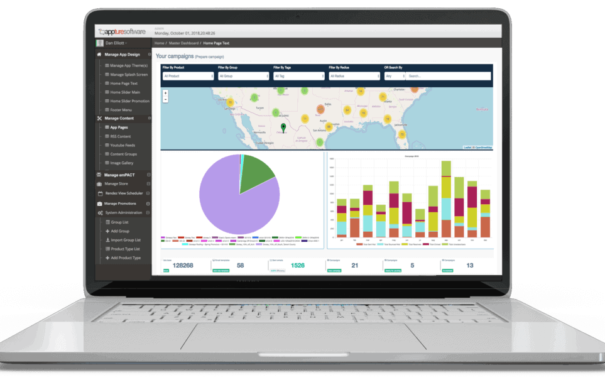Web Development
We're experts at making sites that are beautiful, powerful, stable and affordable. And, we have hundreds of awesome designs. Now, is that such a bad thing? Why not give us a call?
Read moreWe're experts at making sites that are beautiful, powerful, stable and affordable. And, we have hundreds of awesome designs. Now, is that such a bad thing? Why not give us a call?
Read moreThe Facts are: Apps are more feature rich, have higher conversion and are more secure. We've built our own App CMS, Apptify, and we deliver what others can only promise.
Read moreVideo delivers better than any other form of marketing.
We provide the stage, the tools, the experience & the talent to produce content that gets results.
If you've got friends in ``Low Places`` it's only because they aren't using Social Media in their marketing, If your brands in ``Low Places`` then you definitely need to call us.
Read more
Our social media marketing platform enables you to identify the right social media influencer marketing strategy. Search for and invite targeted potential partners. Synchronize outreach,track your campaigns, optimize existing partnerships, measure success and prove social media reach, referral and clickthrough.
Import images, videos and rss feeds, lists, publish bulk postings, find influencers and create bulk invitations. Create content, publish links, videos and chat from within a single dashboard. Automate postings from an easy to use Calendar from a single secure dashboard.
Fear not, this is the time to upgrade for a better design template with enhanced features. Does your website need to be mobile-friendly? Now’s the time to upgrade. Need Social Media links and postings? Streaming Video? Ecommerce? No problem.
In many cases, we can import your old website into a new theme, and add some new life to the framework and relaunch it in weeks.


Online events with the ‘old-fashioned’ vibe of live events. In today’s post covid era, virtual events have become the new standard. Say goodbye to the “not another zoom meeting!” reaction. Our virtual events are the kind your target audiences wants to experience.
We’ll take you to the next level with bespoke services and no limite 4k multipoint streaming. Your audience will be captivated by a webinar, product launch, presentation, or online course. Viewers are actively involved in a conference, seminar, summit, kick-off, theme day, or session. A better solution is a curated one.
There now, feel better? Call us, it gets easier.
Here’s the deal. If you don’t promote, your business will die. A long, slow death filled with hand-wringing and night sweats. The other option is, you screw up your promotion and people hate your company. You pick.
Sometimes, it’s the simple things that make the difference. Things like recognizing that one email contact does not represent a “campaign” or that “getting your name out there” is a myth.
Schedule promotions based upon prior contact, then re-engage with increased detail or extended offers, price, preference, variety or prestige. All fully compliant with Can SPAM rules and guidelines.


More Power, Less Cost. No Code. No Compromises.
Push social media, website content, mobile pages, videos, alerts, events, rewards.Anything you select, to anyone you desire, from a single secure dashboard.
We’ve built hundreds of apps for Apple, Android phones and tablets.
We weren’t satified with the tools available, so we invented our own. Apptify is custom developed product line of app tools, promotions, reporting and security that delivers Android and Apple mobile applications for private industry, education, transportation and government.
We’ll build it in the cloud, so you can edit your app, see reports, send alerts, run your business and manage your brand.
Like the pro’s do, With no additional software needed.

We create experiences that transform brands, grow businesses and make clients happy.
Our core strength and key value to clients is the ability to turn deep insights into marketing with greater stopping power & relevance, leading to greater results.
Branding, Technology Services
Education & Public Safety
Property Management & Trade Services
Business To Business Growth
Process Management & Business Growth
Branding, Marketing & Technology Services
